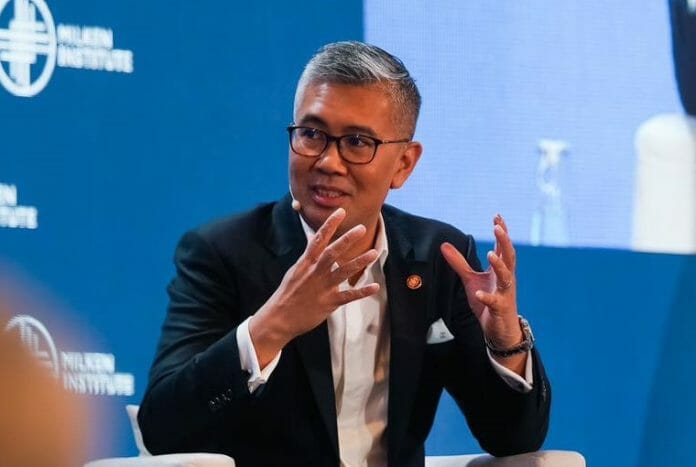The Government is committed to continuously support growth of the EV industry in Malaysia through a holistic approach which includes effective governance, incentives, enabling regulations and harmonisation of standards aligned with the recently launched New Industrial Master Plan (NIMP) 2030 under a clear mission — Push for Net Zero.
Speaking at the launch of Tron Bradbury Energy (Malaysia) Sdn Bhd (TBE) electric vehicle (EV) factory at the Port Klang Free Zone today (Jan 19), Minister of Investment, Trade And Industry (MITI) Tengku Zafrul Tengku Abdul Aziz said under one of the Action Plans, the Government has identified Electric Vehicles (EVs) as a key growth driver, providing further impetus for development of the EV in the country.
Through National Electric Vehicle Steering Committee (NEVSC) and National Electric Vehicle Task Force (NEVTF), numerous policies and procedural improvements have been successfully implemented to ensure a conducive and well-regulated investment and business environment within the EV ecosystem.
EV Industry Statistics And Growth
Despite the EV industry being relatively new Malaysia, statistics indicate a significant upward trend in the EV demand in 2023. According to the Malaysian Automotive Association’s (MAA), the sales of Battery Electric Vehicles (BEVs) shot up by over 200% year-on-year.
Last year, more than 10,000 BEVs were sold, compared to roughly 3,000 units in 2022. If we combined both hybrid and full EVs, the volume of electrified vehicles or xEV sold last year made up about 5% of nearly 800,000 units total industry volume (TIV), which is a 70% year-on-year increase.
“Our target is to have EVs reach at least 20% of TIV by 2030, 50% by 2040 and 80% by 2050, and I am confident we are on the right track to reach those targets,” Zafrul said, “Our intention is clear: EVs must be accessible to the masses, for us to reach critical mass that will support our net zero goal by 2050. Observing their progress, I am optimistic that the electrification of our automotive industry will not only accelerate, but also achieve our policy targets within or perhaps even before the stipulated timeline.”
Tengku Zafrul said he sees TBE to also play its role in contributing to Malaysia’s future EV numbers, especially in the manufacturing and assembly of commercial EVs such as e-Buses, e-Vans, e-Trucks and e-Tractors. Yes, our EV targets must not only be limited to passenger cars, but also extend to public transport, such as electric buses, whose production TBE will be heavily involved in.
Automotive Industry’s Contribution To National Economy
Malaysia’s automotive ecosystem is a key contributor to the national economy, providing employment for over 700,000 people, constituting more than 4.4% of Malaysia’s workforce. The ecosystem contributes approximately 4% to Malaysia’s GDP annually.
Looking ahead, MITI remains steadfast in its dedication to further develop our automotive industry. The NAP 2020 serves as a blueprint for positioning Malaysia as a regional automotive hub for Energy Efficient Vehicles (EEVs), including electric vehicles (EVs), with a strong emphasis on the development of Next-Generation Vehicles (NxGV), Mobility as a Service (MaaS), and the integration of Industry 4.0 technologies.
Tengku Zafrul noted while the automotive sector contributed almost RM64.5 billion in 2022, the NAP aims to increase its contribution to roughly RM104 billion to GDP by 2030. In addition to the GDP target, the NAP 2020 has set to achieve by 2030, a TIV of 1.22 million units, automotive parts and components exports valued at over RM28 billion, and the creation of 323,000 job opportunities.
TBE’S Role In EV Development And Malaysia’s Net Zero Targets
“I am delighted to witness the signing of the MoU between Tron Bradbury Energy (Malaysia) Sdn Bhd (TBE) and Bradbury Asset Management (Hong Kong) (BAMHK). TBE is set to transform its current assembly operation in Port Klang Free Zone into a dedicated manufacturing facility. Not only this, TBE also has a plan to establish the battery R&D facility in Malaysia. These two plans, when realised, will mark a significant step forward, and I’m excited to see the positive impact and opportunities it will bring to our people, supporting SMEs and Malaysia as a whole,” he said.
With governments worldwide seeking sustainable mobility solutions to achieve their individual carbon neutrality targets, and consumers demanding better battery performance and improved electric mobility ecosystems.
The minister also called on TBE to incorporate principles of Environment, Social, and Governance (ESG) into their operations. The embracing of ESG practices is what will create long-term value, and attract responsible investors, citing manufacturing must prioritise not only productivity and efficiency but also lean towards clean and energy efficient solutions and hopes TBE is committed to continuous improvement, including reducing its carbon footprint by adopting or further increasing its renewable energy generation and ‘greening’ in its core operations.
These are the kinds of high-quality investments that the Government is prioritising under our New Investment Policy and NIMP2030. Additionally, it is equally important to consider the spillover effects that each investment brings. The projects undertaken should also create high-value job opportunities and enhance domestic linkages for SMEs’ benefit. This holistic approach is what will ensure balanced and inclusive growth for the nation and he sees tremendous potential for value creation in the partnership between TBE and Bradbury Asset Management.
On behalf of the Government, MITI welcomes TBE’s evolution from an EV assembly operation to a full-scale manufacturing, including establishing its regional battery R&D hub in Malaysia. TBE’s endeavours will not only contribute to the EV Industry but also play a crucial role in further developing Malaysia’s E&E industry, seeing how essential E&E components are in EVs.
“It’s my fervent hope that our local industry continues to earn their stripes in the EV regional ecosystem and supply chain, in line with Government’s agenda and aspirations to help to ensure Malaysia’s resilience, competitiveness and most importantly, continued relevance in the regional supply chain in line with global technological advancements, so that we can attract quality investments, expand trade and offer higher-paying jobs for our ‘Rakyat’,” he added.









